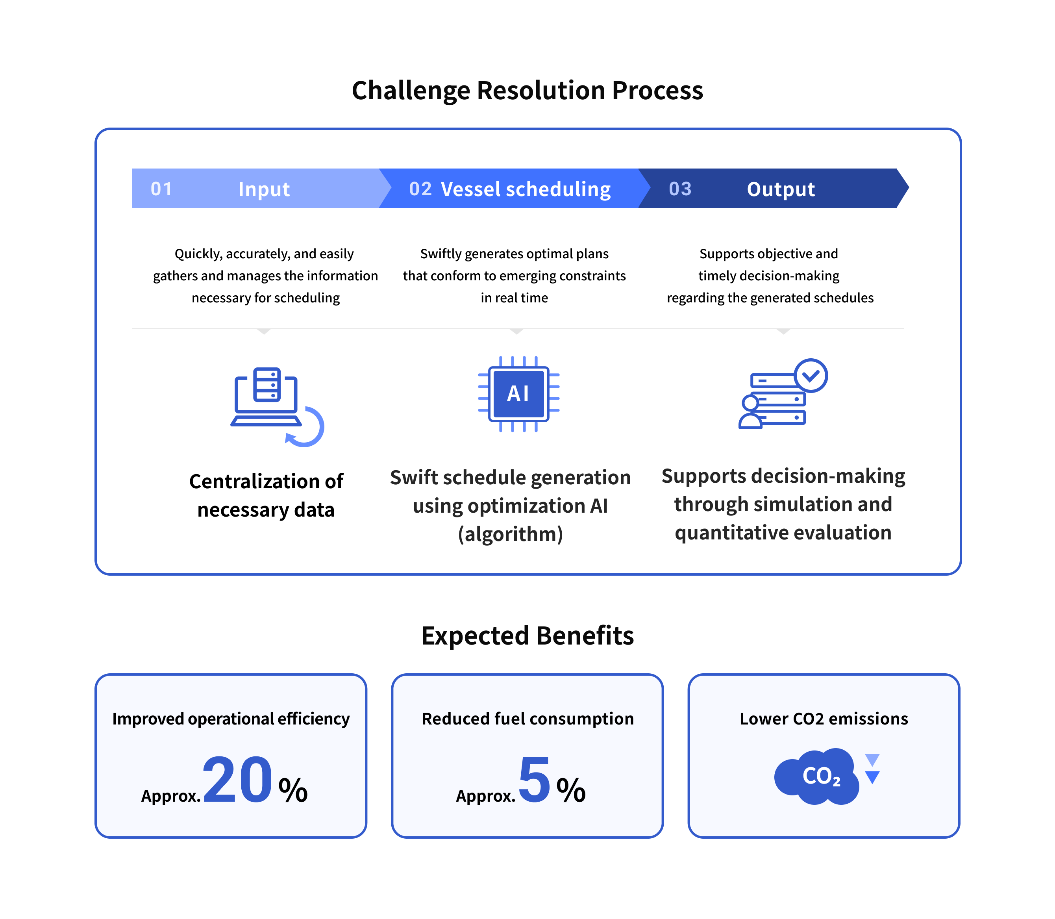Cosmo Oil Introduces ALGO ARTIS AI-Driven Planning and Scheduling Solution “Optium” for Coastal Vessel Scheduling Aiming to Improve Operational Efficiency by Approximately 20% While Contributing to Fuel and CO2 Reductions
April 15, 2025
Cosmo Energy Holdings Co., Ltd.
Cosmo Oil Co., Ltd.
ALGO ARTIS CORPORATION
Cosmo Oil Co., Ltd. (hereafter, “Cosmo Oil”), a subsidiary of Cosmo Energy Holdings Co., Ltd., has announced the introduction of Optium, an AI-driven planning and scheduling solution provided by ALGO ARTIS CORPORATION (head office: Minato Ward, Tokyo; hereafter, “ALGO ARTIS”). The system, which supports the scheduling of coastal vessels1 transporting petroleum throughout Japan, became fully operational in April 2025.

While coastal shipping of petroleum products plays a vital role in ensuring safety and supply stability, vessel scheduling must account for numerous unpredictable factors, such as weather conditions and berth2 availability. As a result, vessel scheduling has traditionally been highly complex and labor-intensive, with certain tasks still being performed using analog processes, posing significant challenges to improve overall operational efficiency.
The newly introduced “Optium” uses proprietary optimization AI (specialized algorithms) to quickly and flexibly process complex operational constraints, automating and streamlining vessel scheduling. By consolidating data and standardizing formats, the system improves management efficiency. Additionally, it systematizes the entire workflow—from data input to output, including autonomously generating and evaluating shipping schedules— contributing to overall improvements in operational efficiency.
◼️Features and Benefits of AI-Driven Planning and Scheduling Solution Optium
1. Input (Data Entry): Centralized Data Management
Quickly, accurately, and easily gathers and manages the information necessary for scheduling; reduces redundant processes by standardizing data formats, leading to greater operational efficiency and fewer errors
2. Vessel Schedule Development: Fast Schedule Generation with Optimization AI (Specialized Algorithms)
Swiftly generates optimal plans that dynamically conform to emerging constraints through the real-time synchronization of shipping schedules, berth availability, and inventory charts
3. Output: Strengthened Decision-Making through Simulation and Quantitative Evaluation
Automatically produces the information needed for evaluation, creating an environment that supports objective and timely decision-making regarding the generated schedules

With the introduction of “Optium”, operational efficiency is expected to increase by approximately 20%, while fuel consumption is projected to decline by about 5%. The optimization of vessel scheduling is also expected to contribute to a reduction in CO2 emissions, making this initiative a meaningful step toward mitigating Cosmo Oil’s impact on the environment.
Looking ahead, Cosmo Oil remains committed to further optimizing and enhancing its domestic marine transport operations, while contributing to advance both digital transformation (DX) and green transformation (GX) initiatives.
Press release issued by ALGO ARTIS: (available in Japanese only)
1. Coastal vessel: A vessel that transports cargo between different ports within Japan; at Cosmo Oil, such vessels play a key role in transporting petroleum products between refineries and from refineries to oil depots (storage hubs) across the country
2. Berth: An allotted place where cargo is loaded onto or unloaded from a ship; also referred to as a pier
(End)
(The official language for Cosmo Energy Group's filings with the Tokyo Stock Exchange and Japanese authorities, and for communications with our shareholders, is Japanese. We have posted English versions of some of this information on this website. While these English versions have been prepared in good faith, Cosmo Energy Group does not accept responsibility for the accuracy of the translations, and reference should be made to the original Japanese language materials.)